Tipping dive professionals in the scuba industry is always a hot topic. When it comes to how much to tip a dive guide, opinions vary hugely depending on personal experience and cultural expectation.
We firmly believe that people should be paid fairly for the work they do, and the expectation for tips to make up for low wages is one of the many things people would like to change about the dive industry.
But with tips being the norm in many locations, you’re here because you want to know how much to tip your scuba guide! We’re here to unpack the factors that go into tipping in the dive industry, and to help you know how much to tip, when, and to whom.
Where are tips expected?
The trouble with tipping is the huge variation from culture to culture. In the US, generous tips are an expectation in most service based industries due to the way people are paid. In the UK and most of Europe, tips are usually a bonus awarded for excellent service. Australia and Asia have a similar approach to Europe. In some places offering a tip can even be seen as rude and your offer may be declined.
As well as cultural expectation, the pay in the area will also have an impact. In locations with low minimum wages, tips may be more expected. In locations where wages fairly cover the difficulty of the job (such as Australia), you’re more likely to just tip when you’ve been given a great experience.
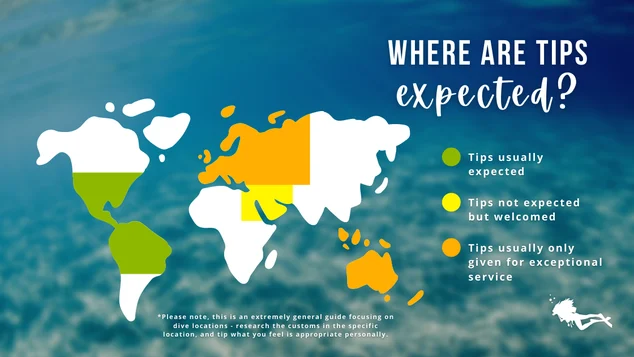
You should also consider what nationality of tourists usually visit that dive location, and who runs the dive operation. Locations which are frequented more by American divers (such as diving in the Caribbean or Central and South America), are more likely to expect you to tip. Equally, if you’re diving with an American owned operation elsewhere in the world, you may be expected to adhere to American tipping culture.
If you’re still unsure about the expectation where you’re diving, you can ask about your destination in our Girls that Scuba Facebook group!
Why did no-one tell me?
One of the biggest complaints from divers about having to tip in the dive industry is that it’s a hidden cost.
Costs should be clear up front to make it easier to budget for trips, so a sudden expectation to tip when you arrive on a boat can be challenging. However, if you’re a responsible traveller it’s not about whether you agree with a local custom, it’s about being respectful of it.
If you’ve done your research and discovered that tipping is common wherever you’re travelling, it simply becomes a cost that you can plan for. Find out if tipping is customary in your destination and budget accordingly.
When should I tip the dive crew?
Now you know that tipping is the norm in your dream dive destination – what’s the etiquette on when to hand it over? This can vary depending on what sort of diving you’re doing (more on the differences between day charters, courses, and liveaboards later).
The rough guideline here is if you know you’ll be diving with the same crew or guide for your whole trip, you can tip them at the end of all of your dives. If there’s a chance your guide or crew might change, you might be more comfortable tipping them directly after each dive.

This particularly applies if one member of the team has gone above and beyond for you to provide exceptional service. Captain turned the boat around because you forgot something? Instructor lent you a spare mask? Divemaster found the elusive creature you’ve always wanted to photograph? Show them how much it meant to you!
Who should I tip in scuba diving?
Scuba diving (alongside many other adventure sports industries) is plagued by a belief that because dive professionals often love what they do, they don’t need to be paid as highly for their work. Unfortunately, passion can’t pay the bills.
Dive professionals often work incredibly long hours in a physically demanding job, whilst also taking care of peoples’ lives underwater.
It’s rare to be compensated fairly for their work, so the majority of divemasters, instructors, boat crew, and shop staff will be appreciative of a tip to recognise their hard work.
Although customer service is a huge part of the job, don’t forget that it’s not just your dive guides or the people you directly speak to who make your dives happen. There are so many other staff members behind the scenes, such as crew filling your cylinders, people maintaining rental equipment, staff taking bookings, and people organising courses.
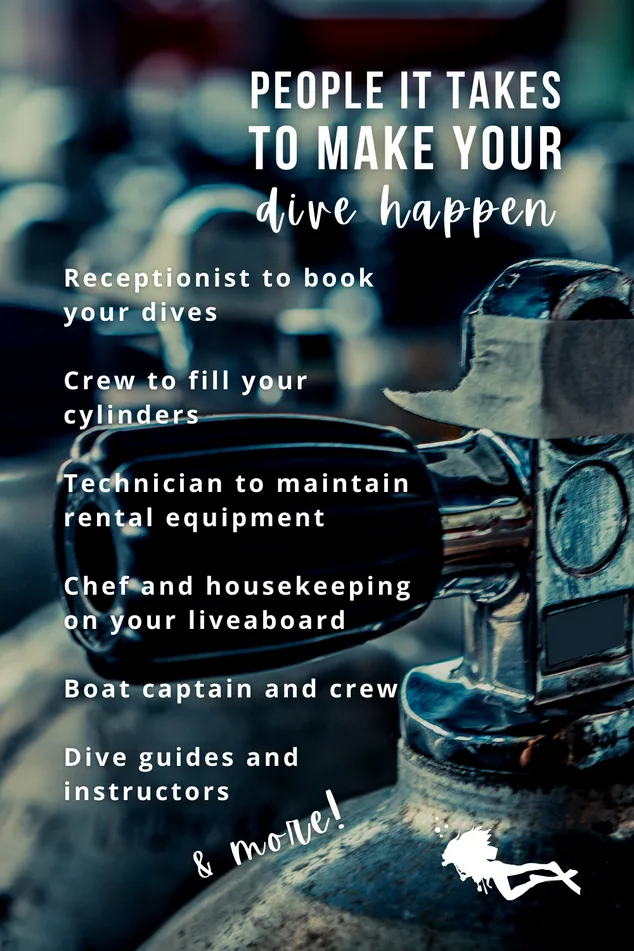
With that in mind, consider making a tip to the entire crew which will then be split between everyone, both front of house and behind the scenes. This is often what happens to tips if there’s a tip box or collection.
If you feel that one particular member of the team made your trip perfect as mentioned above, you can also tip that person directly.
How much should I tip?
In destinations where tipping is common practice, the amount which divers tip their crew seems to be fairly consistent. Most recommendations fall somewhere between $5-10 (US) per tank, although this can vary slightly depending on the type of operation you’re diving with.

The lower end of the $5-10 is probably appropriate if you had a good, safe time and received the level of service you expected. If you feel the service was exceptional and the staff went out of their way to make the experience special for you, perhaps tip closer to $10 per tank.
Specific types of diving may require a slightly different approach to tipping. Here are some things to consider.
Charter Boats
Charter boats are definitely a type of dive operation where tips can become a surprise cost. Day charter staff, particularly in the US, can often be hired as contractors with the only compensation for their work being free dives and discounts on equipment.
It’s not unusual to arrive on a charter boat to see large signs with expected tip amounts, or for it to be mentioned during a briefing that the team only works for tips and that tipping is therefore expected.
Be mindful of this if you’re booking unguided dives on charter boats, and be prepared to budget for tips to prevent it being a shock on the day.
How Much To Tip Scuba Instructors
If you’re taking on a course, the $5-10 per tank becomes less relevant as it doesn’t take into account the time spent with your instructor in the classroom or confined water environments.
A rough guideline for tipping scuba instructors for courses is 10-20% of the cost of the course, but as before, you should tailor this to the experience you feel you’re given.
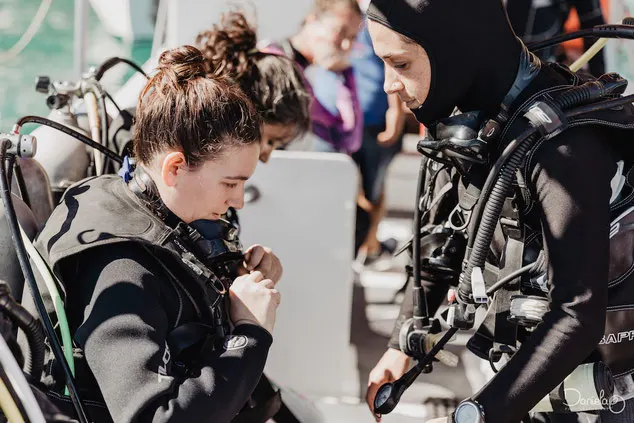
Tipping on Liveaboards
So you know how much to tip for land based trips, but how much should you tip on a liveaboard? Just like in a land based dive shop, a lot of people work incredibly hard to make a liveaboard run smoothly – not just those who are guiding you on the dives.
You’re receiving round the clock service, with the crew making your meals, cleaning your cabin, and of course showing you the incredible underwater sights. Boats are also expensive to run, so crews often don’t make incredible wages without tips to supplement their earnings.
The expectation for tips will depend once again on the local culture, so there may be more of a tipping culture on a Caribbean liveaboard vs somewhere in Asia, for example. The ownership of the liveaboard may also make a difference – it’s often noted that the American tipping culture extends to liveaboards run by American companies.
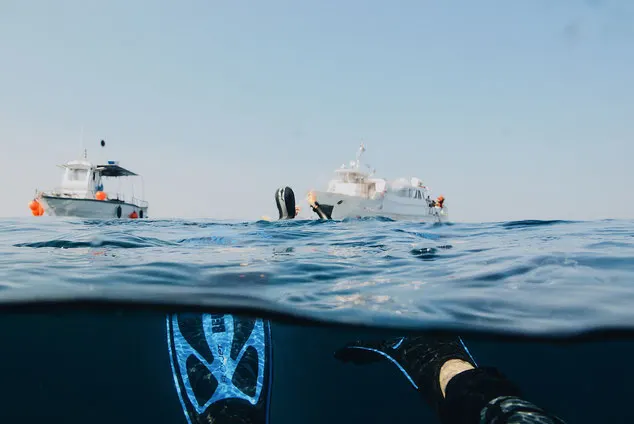
However, it can be easier to know what to expect because liveaboard operators will often include guidelines about tips in your information pack when you book.
If you don’t think you’d be able to budget for a tip on top of an already costly liveaboard, email the operator before booking to ask what the expectation is for tips. This will prevent it being a surprise when you receive the information about your trip.
As for the actual amount to tip, a good guideline is somewhere between 5-10% of the cost of the trip (excluding any taxes and marine park fees). Some people tip up to 20% in exceptional circumstances.
We polled our Girls that Scuba Instagram followers on our stories, with the majority saying they tip somewhere between 6-10%.
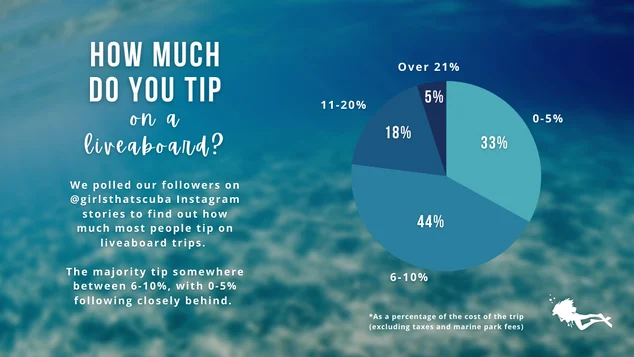
How and when to tip on a liveaboard is a lot more straightforward than land based diving. Because you will be living and diving with the same crew for your entire trip, you can tip at the end. This is generally done in cash, so remember to pack the amount you intend to tip in cash when packing for your liveaboard trip!
As well as tipping the entire crew to ensure everyone’s hard work is rewarded, you can tip a specific person directly if they’ve gone out of their way to make your experience more special.
What if I don’t want to tip in cash?
Some people prefer to tip with experiences or gifts in favour of handing over money. This can include taking your guide for dinner or drinks, or gifting them an item. Whilst this can be a kind gesture, dive professionals can’t pay their bills in gifted bottles of rum!
However, if you’re returning regularly to the same dive operator, presents can be meaningful to the team. If the dive location is remote, an email ahead of time to ask if you can bring along any home comforts in your luggage is a thoughtful touch.
How much do you tip on a dive trip? Join our Girls that Scuba Facebook group to continue the conversation!

